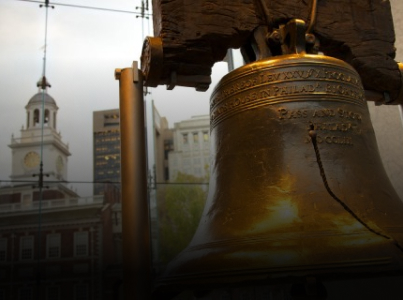Revolutionizing Guest Experiences with AI/ML in the Hotel Industry
January 31, 2023
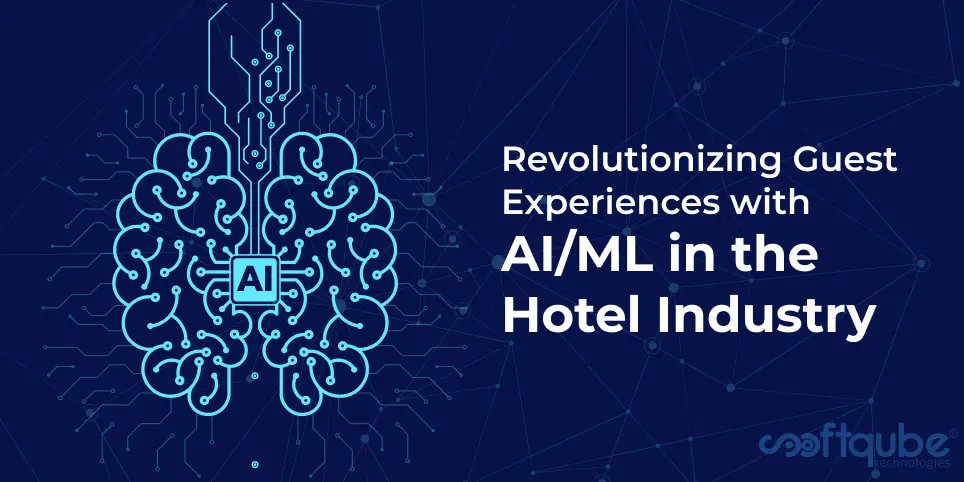
Table of Contents
- Introduction
- What Impact AI/ML Has Created So Far in the Hotel Industry?
- How AI/ML Creates a Promising Future To Improve the Guest Experiences In Years To Come?
- Improving Hotel Guest Experiences
- Forecasting and Patterns of Occupancy
- Fulfilling Guest Expectations
- Reinforcing Guest Personalization
- Empowering Guest Journeys
- Complete Support to the Hotel Staff
- Dynamic Pricing
- Conversational Marketing
- Virtual Concierges
- Guest Data Analysis
- Robots
- Predict Utility Usage
- Make Actionable Reviews
- Contactless Procedures
- Smart Hiring Scenarios
- Final Take Away
Introduction
AI has impacted various industries worldwide and is continuously evolving in the customer-focused era. It is a vital part of technology advancements, from smartphones to business software. Companies of all sizes are aware of the significance of adopting new tech solutions to enhance their progress and tackle present challenges and opportunities. The hospitality industry is embracing AI-driven innovations to revolutionize its processes, services, and facilities.
A survey done by the Economic times found rising growth at the global hospitality market in 2020 despite the pandemic situation. Between 2000 and 2021, the hotel and tourism sector received a cumulative FDI inflow of US $15.89 bn. The key motivator for such constant evolution was the deep integration of technology that enabled acceleration and streamlining of the processes thereby making the work execution seamless and simple. AI and ML especially helped in providing customers with personalized services, offered virtual assistance, and analyzed user reviews to improvise and personalize guest experiences.
The hotel industry is constantly evolving and the incorporation of Artificial Intelligence (AI) is the latest technological revolution that is driving growth and revenue. With the help of AI-powered robotics, hotels are able to transform their processes, services and facilities to provide satisfying customer service. This blog will delve into the ways AI is being used in the hospitality industry and the impact it has on the industry’s overall growth.
What Impact AI/ML Has Created So Far in the Hotel Industry?
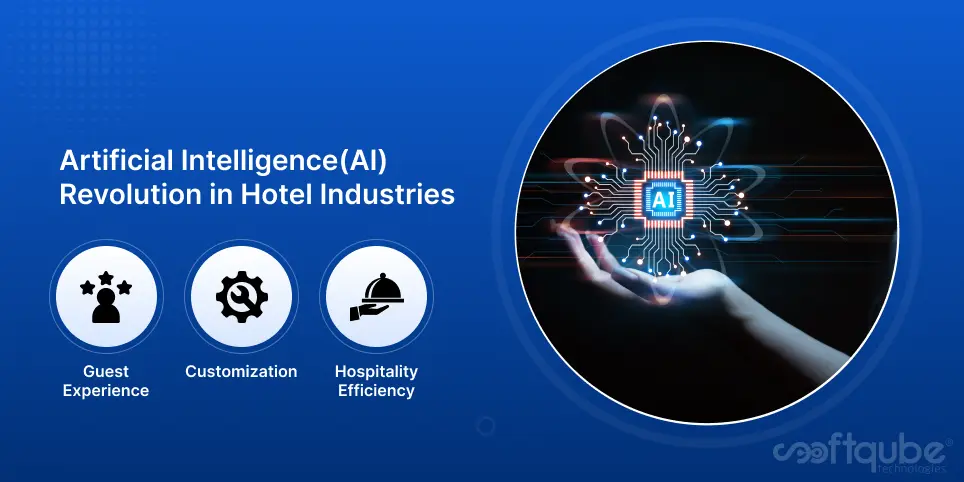
The idea of Making Intelligent Hotels
The idea of making hotels intelligent with AI-powered care and service is gaining popularity among modern hospitality leaders. Essential elements that make hotels intelligent include concierge robots, digital assistance, voice-activated services, travel experience enhancers, and automatic data processing (machine learning). These AI-enabled technologies not only reduce human involvement but also improve the way guest service is delivered, with the goal of meeting customer satisfaction.
AI Entering Hotel Industry
The use of AI in the hotel industry is becoming more prevalent with the integration of voice-activated assistants like Siri and Alexa. These systems use machine learning to gather information about customers and provide personalized experiences. This data can be used to improve customer service, from understanding their preferences and choices to tracking their journey patterns and hotel ratings.
Exquisite Customer Services
The hotel industry is increasingly utilizing AI technology, such as voice-activated assistants and robot concierges, to improve customer service and gather insight on customer preferences. Companies like Hilton Worldwide Hotel have implemented AI-powered concierge robots, like Connie, to assist guests and make real-time recommendations. These robots use AI platforms like IBM’s Watson and travel databases to learn from customer interactions and improve their responses.
Outstanding Service With Mobile Apps
Guests of hotels have come to expect control and flexibility when it comes to their stay. Many hotels offer special perks such as mobile apps that allow guests to control various aspects of their stay, such as room temperature and lighting, and order drinks and meals. AI-driven chatbots play a key role in this customer service, allowing guests to interact with the hotel through the app and perform tasks such as ordering meals and drinks, scheduling reservations, and planning itineraries. These virtual interactions via the mobile app allow chatbots to serve as service representatives, bypassing the need for hotel staff.
Personalization in Services Through the Itinerary
Modern travelers want a combination of personalized service and high service standards when they are on the go. However, managing a hotel can be difficult due to the large amounts of data about guests and staff, which can lead to challenges in providing a seamless customer experience. One solution to this problem is to provide guests with intelligent travel phones. These phones, which are available in the guest room, offer features such as GPS, games and entertainment, a hotel app powered by AI, access to unlimited data and international calls, a handy guide to city attractions, promotional offers, and the ability to book return travel and quickly contact hotel service assistants.
Customer Care
Hotels are using AI to gather more knowledge about their customers in order to improve the guest experience. By analyzing data on customer purchases, travel choices, location preferences, and more, AI can offer personalized recommendations and options to guests. From booking a room to planning a journey, AI can assist guests with a variety of tasks, such as fast online assistance, saving user preferences, and making personalized recommendations. This is made possible through the use of big data and machine learning, which helps hotels understand and address the individual needs of their customers.
How AI/ML Creates a Promising Future To Improve the Guest Experiences In Years To Come?
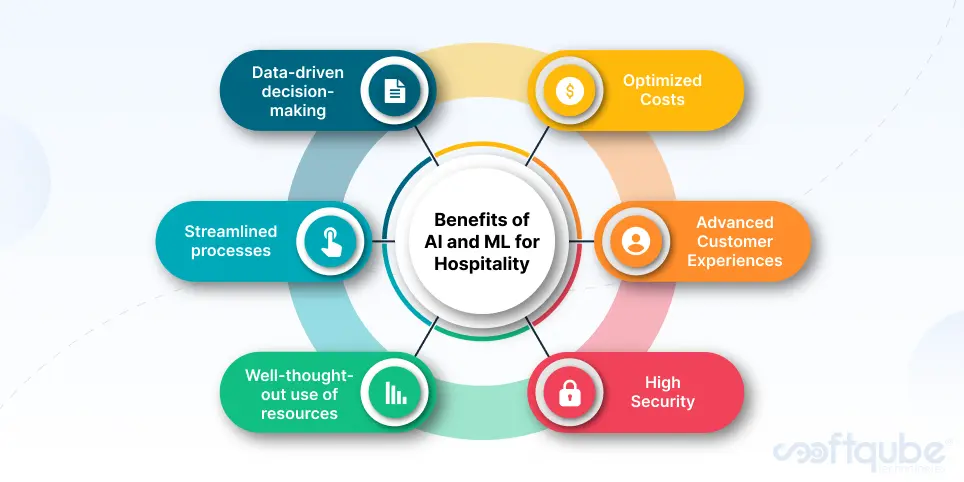
Improving Hotel Guest Experience
The rise of AI has led to a rapid evolution of devices in terms of features and functionality. The breakthrough technology innovations in artificial intelligence, robotics, and IoT are becoming increasingly common in hotels and resorts, driving competitive advantage and changing the way properties and guests interact. One of the main focuses for most hotels is mobile and voice-activated assistants, which offer guests an easy way to interact with the hotel. Guests can control room functions like TV, lighting, music and temperature with voice commands, and make requests to hotel staff and access room service.
One of the key features that makes AI-enabled systems “smart” is their ability to learn and improve through natural language understanding and machine learning. The system can analyze data from past interactions with guests and continuously improve its responses and predictive capabilities. Voice-activated speaker systems and text-based personal assistants have the potential to engage in meaningful conversations and make optimal recommendations, shortening guest wait times and increasing overall satisfaction.
According to research, AI-enabled response technology can handle an average of 70% of guest requests in hotels where the systems have been implemented, resulting in time and cost savings, and enhancing guest relationships. AI has been shown to reduce the need for human assistance, freeing up staff from routine tasks. Several leading hotel groups have reported that their AI-enabled concierge services have reduced calls to the human concierge desk by 35% or more. Although still in its infancy, AI has more than proven its value in the context of hotel guest services, making it a strong business case for investment in AI technologies.
Forecasting and Patterns of Occupancy
The occupancy rate in the hospitality industry is largely affected by seasons and holidays. Hotel operators use demand forecasting to increase profits. AI can gather information from multiple sources and predict events that could impact occupancy rate and prices.
With access to this information, hoteliers can adjust pricing to be more competitive, create targeted promotional campaigns, and make better strategic decisions. AI enables the industry to analyze customer flow and occupancy patterns, combine this information with business data, and determine the most effective strategies to attract more guests and boost sales.
For instance, hotel managers can utilize AI to distinguish the number of guests from local areas versus other regions or countries. AI will assist them in collecting and analyzing crucial information about guests, including their travel habits and demographic traits, to provide a personalized and memorable experience and foster customer loyalty, setting the hotel apart from competitors.
Fulfilling Guest Expectations
Hotels and resorts have always aimed to handle guest requests in a timely and satisfactory manner. This is because their reputation is heavily dependent on the level of customer service they provide. Their abilities in this area are considered key performance metrics for success.
Today, the challenge is that guests have much higher expectations. The concept of a hotel guest experience has changed in recent years due to demographic and technological shifts. Guests now expect a seamless and frictionless experience throughout their stay, with fast responses to inquiries and personal attention from staff. With the rise of technology-enabled access to information and services in many aspects of life, guests expect this luxury to extend to their hotel experience.
In the future, hotels are likely to be facilitated by a combination of human and machine efforts. Artificial intelligence has the potential to reduce latency between guest requests and hotel response time, enhance the in-room guest experience, and customize services and activities for individual guests. IoT devices can also help update the room with personalized settings and predict which services and activities will be of interest to guests. All of these elements work together to meet and exceed the wave of rising guest expectations.
Reinforcing Guest Personalization
Guest personalization is a top priority for hotels today as they strive to meet the increasing expectations of their guests and maintain a competitive edge. It is quickly becoming a minimum requirement for hotels to remain in the industry. In recent years, hotels have shifted their focus from physical upgrades such as upgraded guest rooms and technology-enabled amenities to providing guests with personalized stay experiences.
For many hotels and resorts, success will depend on their ability to gain a deep understanding of their guests on an individual basis and use that knowledge to enhance the guest experience. A majority of hoteliers believe that targeted personalization, which involves presenting guests with relevant messages, offers, and services at the right time, is an effective way to improve guest satisfaction and loyalty.
Room customization is a crucial aspect of guest personalization. Artificial intelligence can be used to make a guest’s stay more personalized, right down to their preferred lighting and temperature control settings, music playlists, and streaming content. The more frequently a guest stays at a hotel, the more the hotel will learn about them and enhance their guest experience through personalization. In the future, hotels should aim to predict guest wants and needs and proactively address them even before the guest’s arrival.
Empowering Guest Journeys
The guest journey is a record of all interactions and transactions between the hotel and a guest from the start of their stay until they check out. Hotel operators are focusing on mapping and analyzing the guest journey to identify areas for improvement and provide a better experience for guests. The guest journey can start before the guest even sets foot in the hotel, from the research and booking process, and can continue even after the guest leaves the property.
The mapping of the guest journey helps hotel operators identify patterns and shortcomings in the guest experience. However, this exercise can be challenging. With the increasing use of machine learning in the hospitality industry, it is likely to play a crucial role in monitoring the different elements of the guest journey, assessing performance, and flagging areas for improvement. AI technology can also resolve issues and suggest new innovations to improve guest satisfaction. According to a survey, 82% of hoteliers believe AI technology will generate actionable insights for improving business processes and enhancing the guest experience.
The use of messaging apps has been a focus of the hospitality industry, with the goal of building guest loyalty, increasing engagement, and enhancing the overall guest experience. Some hotels send an invitation to their messaging app to guests after they book their stay. On an opt-in basis, guests can receive pre-stay notifications, explore neighborhood guides, set preferences, and communicate with the social care team. The evolution of hotel messaging and the extent to which messaging apps will incorporate artificial intelligence is a topic of interest. It is clear that the conversation between hotels and guests will shift from a request-based one to a two-way dialogue, largely enabled by artificial intelligence.
Complete Support to the Hotel Staff
The migration from humans to machines in the hotel industry is an important issue for hoteliers to consider. They need to assess how this migration will affect existing jobs and if humans and machines can work together for mutual benefits for hotel staff and guests. A majority of hoteliers agree that artificial intelligence (AI) improves employee satisfaction, as it allows employees to focus on higher-value tasks by handling mundane tasks like answering frequently asked questions.
At a major hotel group, AI has reduced the workload of customer support reps and improved the guest experience. The hotel group was struggling to keep up with the volume of support tickets and needed to improve response times. They implemented AI-enabled virtual assistants with natural language integration and self-learning capabilities. The technology integrated with the hotel’s case management tools and improved over time with each interaction. As a result, call resolution times have decreased and the human support personnel are now able to focus on higher-value tasks.
Technology adoption requires a culture change within the organization. Employees need to understand the benefits of AI and overcome any fears they have about job security. AI needs to be part of the overall business strategy and employees need to be included in the strategy to see how they can work together with the technology for mutual benefit. By doing so, employees can fit into higher-level roles and improve the guest experience, as well as their own employee experience.
Dynamic Pricing
In the past, hotels had a standard approach to offering suite upgrades. The revenue manager would set a fixed price for the upgrade, which would be communicated to the front desk and offered to every guest who walked through the door. The price was not adjusted based on guest preferences or market conditions, and the offer was sometimes sent through email without much consideration.
Today, ML-powered hotel upselling uses advanced algorithms to determine the most appropriate pricing based on various factors such as the booked rate, room type, current rates, guest demand, and room availability. The system continues to learn from guest interactions and improve its decision-making abilities with each interaction.
The hospitality industry can harness the power of AI to optimize operations and increase customer retention. AI can perform tasks typically done by human staff effortlessly and efficiently, leading to various benefits for the industry. These benefits include:
- Optimal room rates: AI can help set room rates based on occupancy levels, market trends, and algorithms to attract a target group of customers.
- Dynamic pricing: The technology can adjust pricing in real-time, taking into account seasonal changes and market conditions, to maximize profits.
- Real-time updates: AI can update rates across multiple platforms in real-time, keeping up with market demands.
- Performance comparison: AI can compare the performance and ratings of a hotel to others in the local community, helping hotel managers make informed decisions.
With AI integrated into operational systems, hotel managers have the ability to track market trends, anticipate local events, and respond accordingly. This not only maximizes profits by automating tasks but also reduces the need for human effort and minimizes errors.
As the hotel industry continues to recover, it’s crucial for hoteliers to take advantage of the increasing demand by offering relevant and personalized offers to guests. By utilizing ML technology, hotels can ensure that their upselling efforts are more effective and result in a better guest experience.
Conversational Marketing
The hospitality sector has embraced the use of AI and automation technologies, aiming to improve guest experience. AI-powered chatbots, functioning as virtual assistants, offer quick and customized assistance to travelers’ inquiries. These chatbots optimize the direct booking process, are always available for customer queries, and provide personalized check-ins/outs and upgrades.
Through conversational marketing, hotels can identify upselling opportunities and engage with customers in a more personalized manner. As an example, hotel groups may utilized any renowned software development company’s AI solution to reach 100% chat automation and achieved a considerable customer satisfaction score.
AI also goes a step further by making recommendations to guests, thereby increasing direct sales by automating functions such as booking, handling FAQs, query support, and payment processing. This advanced technology and focus on customer experience will give hospitality businesses a competitive edge and improve customer loyalty.
Virtual Concierges (Chatbots)
Virtual concierges powered by AI technology have become the preferred mode of communication for both travelers and hoteliers. They not only offer comfort to guests, but also drive revenue for hotels. A study shows that in 2022, about 85% of customers prefer to ask their queries through real-time chatbots, as they are addressed immediately without the need to wait for customer support.
While existing hospitality chatbots fulfill some aspects of digital concierge service, AI-powered solutions offer a more personalized experience for guests while reducing the efforts of staff. Integrating with popular communication channels frees up hotel staff to focus on complex requests, leading to an elevated guest experience. The hospitality industry can leverage virtual concierges to:
- Create a seamless guest experience that drives sales and loyalty
- Handle time-consuming tasks and improve employee satisfaction
- Respond faster to inquiries with accurate service
- Communicate in over 100 languages through automated translations
- Open up communication channels, such as social media and instant messaging (WhatsApp, Facebook, Instagram, WeChat, Google My Business, SMS), to generate additional revenue streams
- Highlight local attractions and businesses
For instance, when guests visit a hotel’s website with inquiries, virtual chatbots attend to their questions and respond promptly. With their concerns satisfactorily resolved, customers are more likely to take advantage of the hotel’s upselling offers. AI-driven virtual concierges provide guests with an efficient and high-end user experience, allowing them to access information and services whenever they desire.
Guest Data Analysis
The rise of Alexa and Siri has paved the way for the widespread adoption of voice-activated services. In order to provide guests with a comfortable and personalized experience, hotels are incorporating voice automation into their offerings, allowing guests to control room amenities using only their voice.
With the advancements in technology, hotels can utilize conversational AI in the form of voicebots that can process incoming voice messages from popular social media and messaging apps such as WhatsApp and Facebook Messenger. These advanced Interactive Voice Response (IVR) systems can also answer guest queries through natural-sounding voice notes, providing a more intuitive and user-friendly experience.
Voice-activated services rely solely on Artificial Intelligence to recognize speech and respond appropriately, providing a personalized experience for guests. This smart feature allows guests to complete a range of tasks, such as requesting room service, making reservations at the hotel restaurant, accessing tourist information, ordering specific items, and even booking excursions.
For example, if a guest wants to adjust the room’s temperature, they simply need to say “turn up the temperature” to the voice-controlled smart hubs in the hotel. Voice technology can also be used for entertainment purposes, with devices programmed in advance with the guest’s name to further enhance their personalized experience. In-room voice-activated services also allow guests to interact in their native language, removing any language barriers.
Robots
The integration of Artificial Intelligence in hospitality management through robotics has a bright future in the industry. Service robots equipped with AI have the ability to carry out tasks, both simple and complex, with greater accuracy and consistency. The hotel segment has significantly contributed to the growth of the hospitality robots market, which was valued at $295.3 million in 2020 and is estimated to reach $3,081 million by 2030.
The main objective of robots in the hospitality industry is to improve and enhance the guest experience. This can be achieved by performing activities such as greeting guests, guiding them to their rooms, delivering snacks and orders to their rooms without affecting availability, and cleaning and disinfecting facilities.
Current advancements in robot technologies have resulted in a higher level of intelligence and capability to process holistic thinking, enabling better customer engagement in an intuitive and natural manner. Staying updated with the latest trends in Artificial Intelligence will help hotel professionals better understand their customers’ needs and provide them with innovative and exceptional experiences.
Predict Utility Usage
Hotels looking to improve revenue and save energy, water, and waste should focus on utilizing AI-powered tools. A study shows that on average, US hotels spend 6% of operating costs on utility bills. These expenses can be reduced through the implementation of AI energy management, which goes beyond energy-saving lighting systems and predicts maintenance needs for equipment.
This modern and smart management solution, supported by IoT devices, provides real-time data on energy usage, monitoring factors like temperature, air pressure, and humidity, and adjusts the HVAC accordingly. Hoteliers can use AI to better understand their energy consumption and reach efficiency goals while creating a more sustainable environment.
Make Actionable Reviews
Acquiring new customers is five times more expensive than retaining existing ones, so hoteliers are embracing AI-powered response systems to improve guest satisfaction. The AI system analyzes qualitative feedback data, providing insights and information from vast amounts of text.
Hoteliers can automate review management with AI, collecting, storing, and analyzing reviews from multiple sources, freeing up staff to focus on other tasks and avoiding additional pressure on employees. Sentiment analysis highlights positive and negative comments, enabling hoteliers to respond to guest requests in an appropriate tone, with the right information, at the right time.
AI-powered review systems enable hotel staff to quickly and easily resolve customer issues, boosting both business and guest experience. With AI technology constantly advancing, hotels are leveraging AI to improve the guest experience and respond to customer needs effectively.
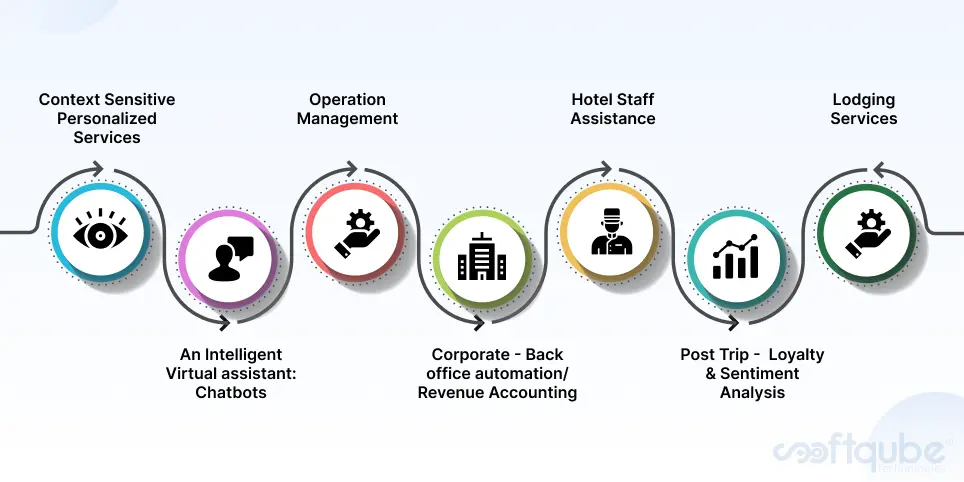
Contactless Procedures
In the wake of the pandemic, contactless technology has gained prominence in the hospitality sector. A survey reveals that 70% of millennial travelers prefer a hotel experience with minimal physical contact. AI-powered contactless technology offers the following solutions:
- Virtual Concierge service
- Automated check-in/check-out
- Voice-activated room service
- Automated spa booking assistance
- Contactless digital payments
- Robotic service
Designed for customers seeking frictionless service, AI-integrated hospitality solutions automate various aspects of hotel operations, allowing for a personalized guest experience and timely satisfaction of guest needs. Automated keyless check-in/express check-out is increasingly popular for its convenience, and AI can reduce staffing, documentation, and time costs for the hotel management.
The hospitality industry is embracing AI to meet the growing demand for contactless technology, and new innovations such as facial recognition, cashless payments, and IoT are on the horizon. AI-powered contactless technology will drive the next generation of on-demand hospitality, offering an automated guest experience while increasing hotel revenue.
Smart Hiring Scenarios
The use of AI in the hospitality industry goes beyond improving customer experience and automating operations. It also enables organizations to modernize their recruitment process by using AI-powered tools. According to a report by McKinsey’s Global Institute, it’s estimated that 70% of companies will adopt AI by 2030.
Integrating AI with recruitment will streamline the application process by automatically screening resumes, providing real-time feedback, and eliminating biases. AI can assess applicants’ psychological traits, cognitive skills, personality, and communication, helping recruiters to select the best fit for a particular position.
Moreover, AI can also enhance employee training by providing mobile or web-based learning, as well as assessments to gauge their performance. This will save time for both recruiters and candidates and help overcome the challenges and expenses of hiring top talent.
Final Take Away
AI is rapidly transforming the hotel industry, improving guest experience and reducing the need for human assistance. AI is changing hotel messaging, leading to a two-way conversation with guests, enhancing the in-room experience, enabling personalization, and identifying and resolving issues to increase guest satisfaction and loyalty. AI is already changing the travel lifecycle and will continue to shape the future of the hotel guest experience in the coming years.
In conclusion, the advent of Artificial Intelligence in the hospitality industry has marked the beginning of a new era. With its ability to automate back-office functions, improve customer experience and streamline the recruitment process, AI has proven to be a game-changer for the hospitality industry. It not only simplifies the day-to-day operations of hotels, but also helps them to keep pace with the ever-evolving customer needs and preferences. So, don’t be left behind, embrace the power of AI and take your hotel to new heights of success! Whether you’re a seasoned hotelier or a new entrant, the future is waiting, and it’s ready to be shaped by you.
Share on






